Emotional Intelligence and Leadership Styles of School Principals
VerifiedAdded on 2021/02/19
|9
|2027
|127
Thesis and Dissertation
AI Summary
This PhD thesis examines the relationship between emotional intelligence (EI) and leadership styles of school principals in Sri Lanka. The study investigates the impact of EI on transformational, transactional, and laissez-faire leadership approaches. It explores the level of EI among principals, the connection between EI dimensions (self-awareness, self-management) and leadership styles, and the influence of demographic characteristics. The research includes a literature review, a research questionnaire, and a discussion of the study's rationale and methodologies. The methodologies include a positivism research philosophy, descriptive research design, a deductive research approach, primary data collection through interviews, a sample of 10 principals using a simple random technique, and qualitative thematic data analysis. The thesis also provides a detailed timeline for completing the research activities, including identifying the research topic, reviewing literature, drafting methodologies, completing the proposal, designing the questionnaire, collecting and analyzing data, and finally, discussion, conclusion, and submission.
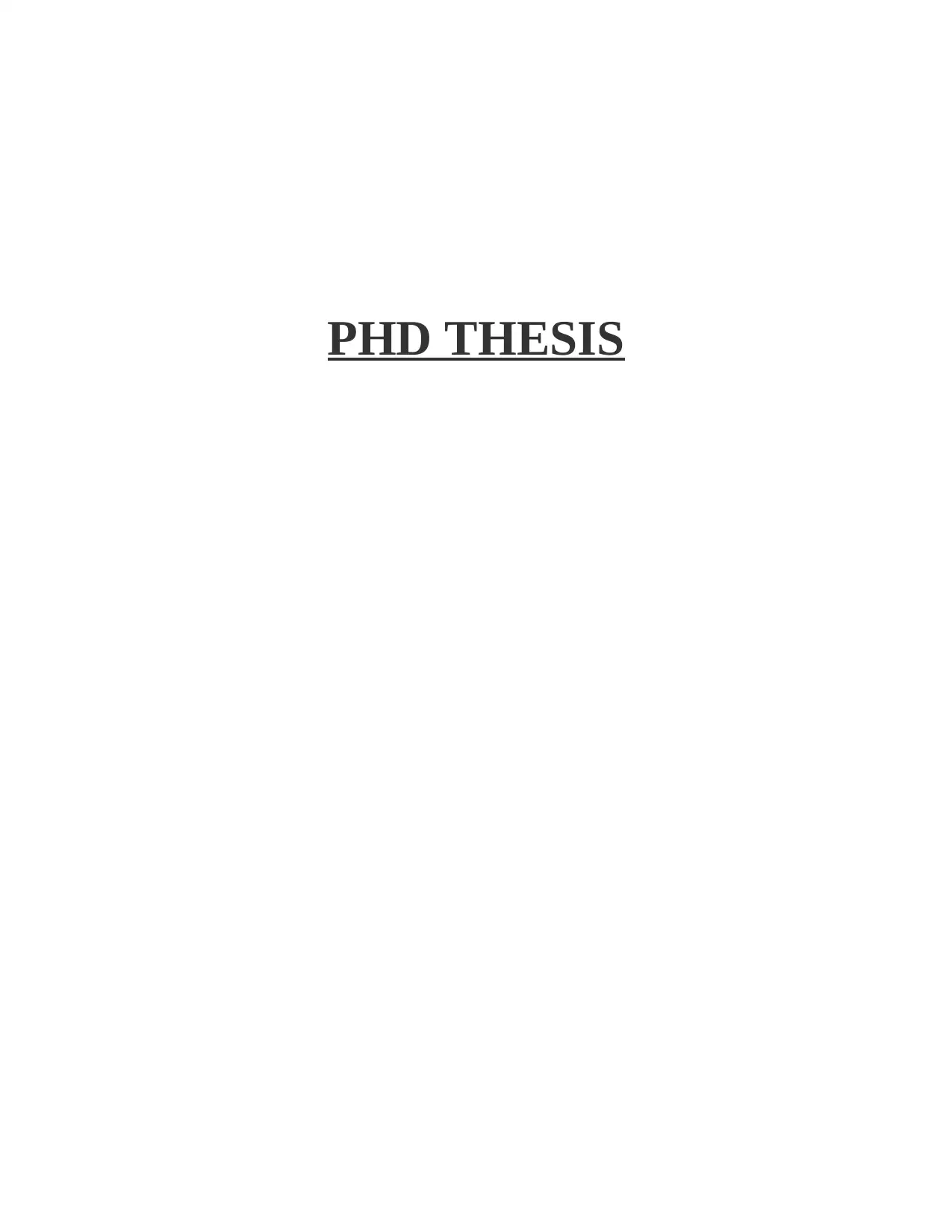
PHD THESIS
Paraphrase This Document
Need a fresh take? Get an instant paraphrase of this document with our AI Paraphraser
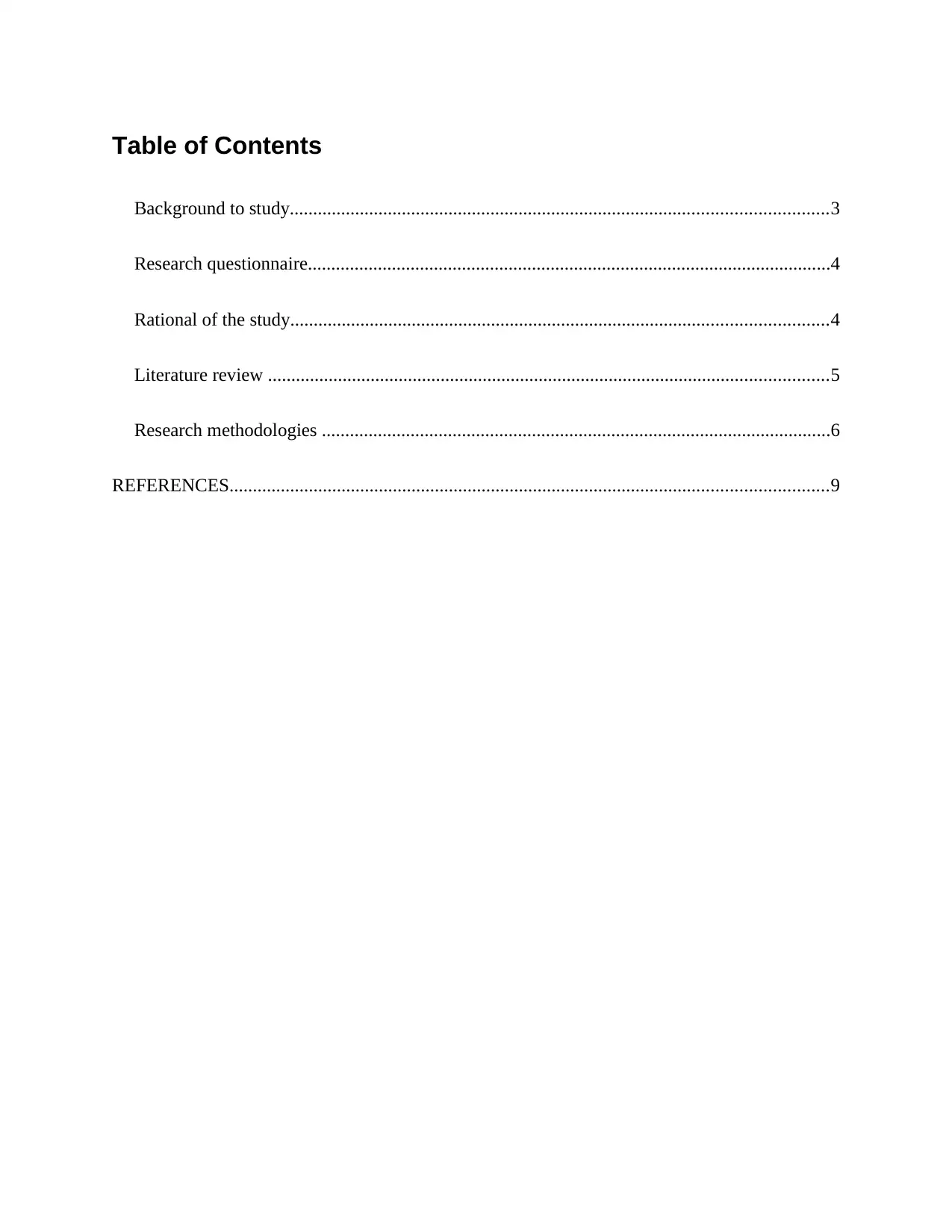
Table of Contents
Background to study...................................................................................................................3
Research questionnaire................................................................................................................4
Rational of the study...................................................................................................................4
Literature review ........................................................................................................................5
Research methodologies .............................................................................................................6
REFERENCES................................................................................................................................9
Background to study...................................................................................................................3
Research questionnaire................................................................................................................4
Rational of the study...................................................................................................................4
Literature review ........................................................................................................................5
Research methodologies .............................................................................................................6
REFERENCES................................................................................................................................9
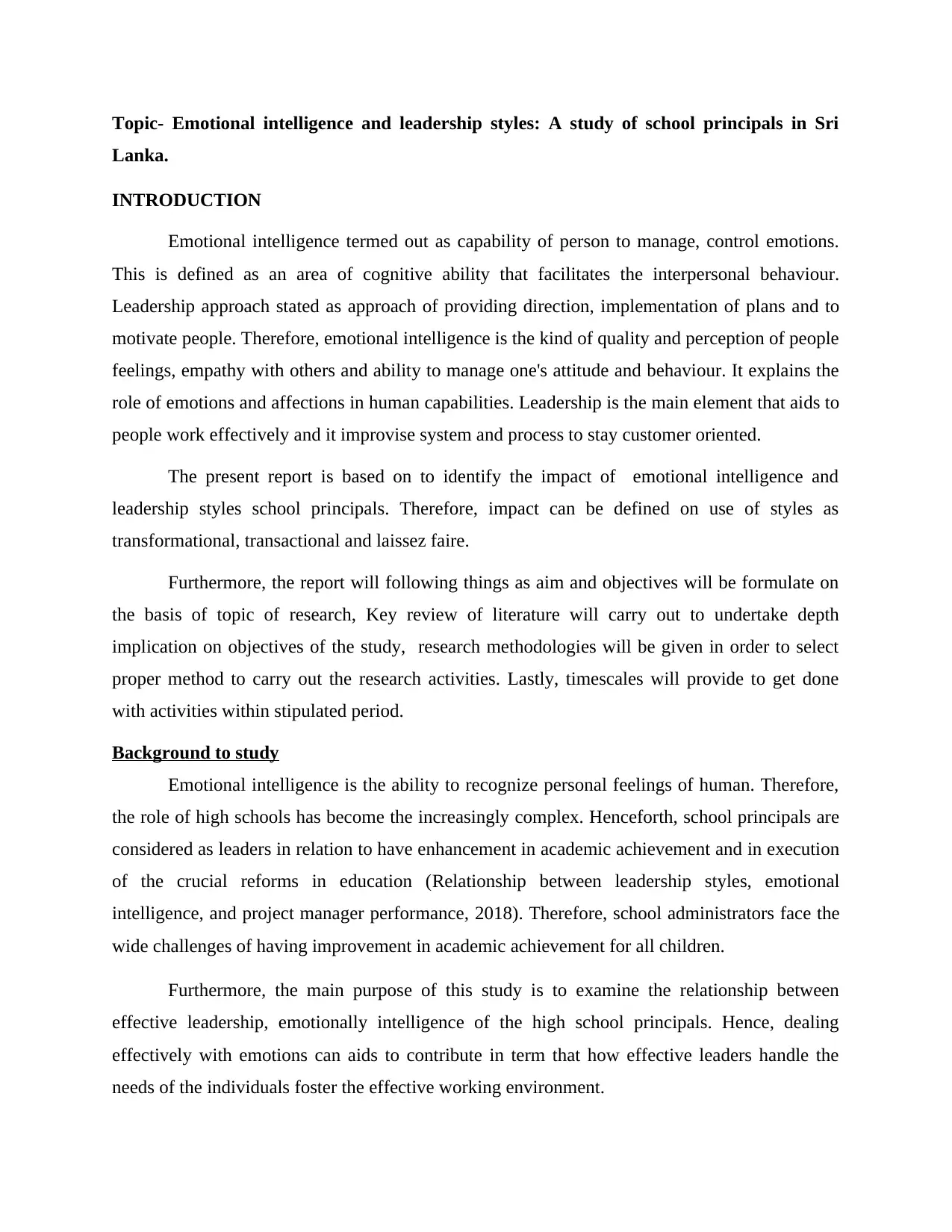
Topic- Emotional intelligence and leadership styles: A study of school principals in Sri
Lanka.
INTRODUCTION
Emotional intelligence termed out as capability of person to manage, control emotions.
This is defined as an area of cognitive ability that facilitates the interpersonal behaviour.
Leadership approach stated as approach of providing direction, implementation of plans and to
motivate people. Therefore, emotional intelligence is the kind of quality and perception of people
feelings, empathy with others and ability to manage one's attitude and behaviour. It explains the
role of emotions and affections in human capabilities. Leadership is the main element that aids to
people work effectively and it improvise system and process to stay customer oriented.
The present report is based on to identify the impact of emotional intelligence and
leadership styles school principals. Therefore, impact can be defined on use of styles as
transformational, transactional and laissez faire.
Furthermore, the report will following things as aim and objectives will be formulate on
the basis of topic of research, Key review of literature will carry out to undertake depth
implication on objectives of the study, research methodologies will be given in order to select
proper method to carry out the research activities. Lastly, timescales will provide to get done
with activities within stipulated period.
Background to study
Emotional intelligence is the ability to recognize personal feelings of human. Therefore,
the role of high schools has become the increasingly complex. Henceforth, school principals are
considered as leaders in relation to have enhancement in academic achievement and in execution
of the crucial reforms in education (Relationship between leadership styles, emotional
intelligence, and project manager performance, 2018). Therefore, school administrators face the
wide challenges of having improvement in academic achievement for all children.
Furthermore, the main purpose of this study is to examine the relationship between
effective leadership, emotionally intelligence of the high school principals. Hence, dealing
effectively with emotions can aids to contribute in term that how effective leaders handle the
needs of the individuals foster the effective working environment.
Lanka.
INTRODUCTION
Emotional intelligence termed out as capability of person to manage, control emotions.
This is defined as an area of cognitive ability that facilitates the interpersonal behaviour.
Leadership approach stated as approach of providing direction, implementation of plans and to
motivate people. Therefore, emotional intelligence is the kind of quality and perception of people
feelings, empathy with others and ability to manage one's attitude and behaviour. It explains the
role of emotions and affections in human capabilities. Leadership is the main element that aids to
people work effectively and it improvise system and process to stay customer oriented.
The present report is based on to identify the impact of emotional intelligence and
leadership styles school principals. Therefore, impact can be defined on use of styles as
transformational, transactional and laissez faire.
Furthermore, the report will following things as aim and objectives will be formulate on
the basis of topic of research, Key review of literature will carry out to undertake depth
implication on objectives of the study, research methodologies will be given in order to select
proper method to carry out the research activities. Lastly, timescales will provide to get done
with activities within stipulated period.
Background to study
Emotional intelligence is the ability to recognize personal feelings of human. Therefore,
the role of high schools has become the increasingly complex. Henceforth, school principals are
considered as leaders in relation to have enhancement in academic achievement and in execution
of the crucial reforms in education (Relationship between leadership styles, emotional
intelligence, and project manager performance, 2018). Therefore, school administrators face the
wide challenges of having improvement in academic achievement for all children.
Furthermore, the main purpose of this study is to examine the relationship between
effective leadership, emotionally intelligence of the high school principals. Hence, dealing
effectively with emotions can aids to contribute in term that how effective leaders handle the
needs of the individuals foster the effective working environment.
⊘ This is a preview!⊘
Do you want full access?
Subscribe today to unlock all pages.

Trusted by 1+ million students worldwide
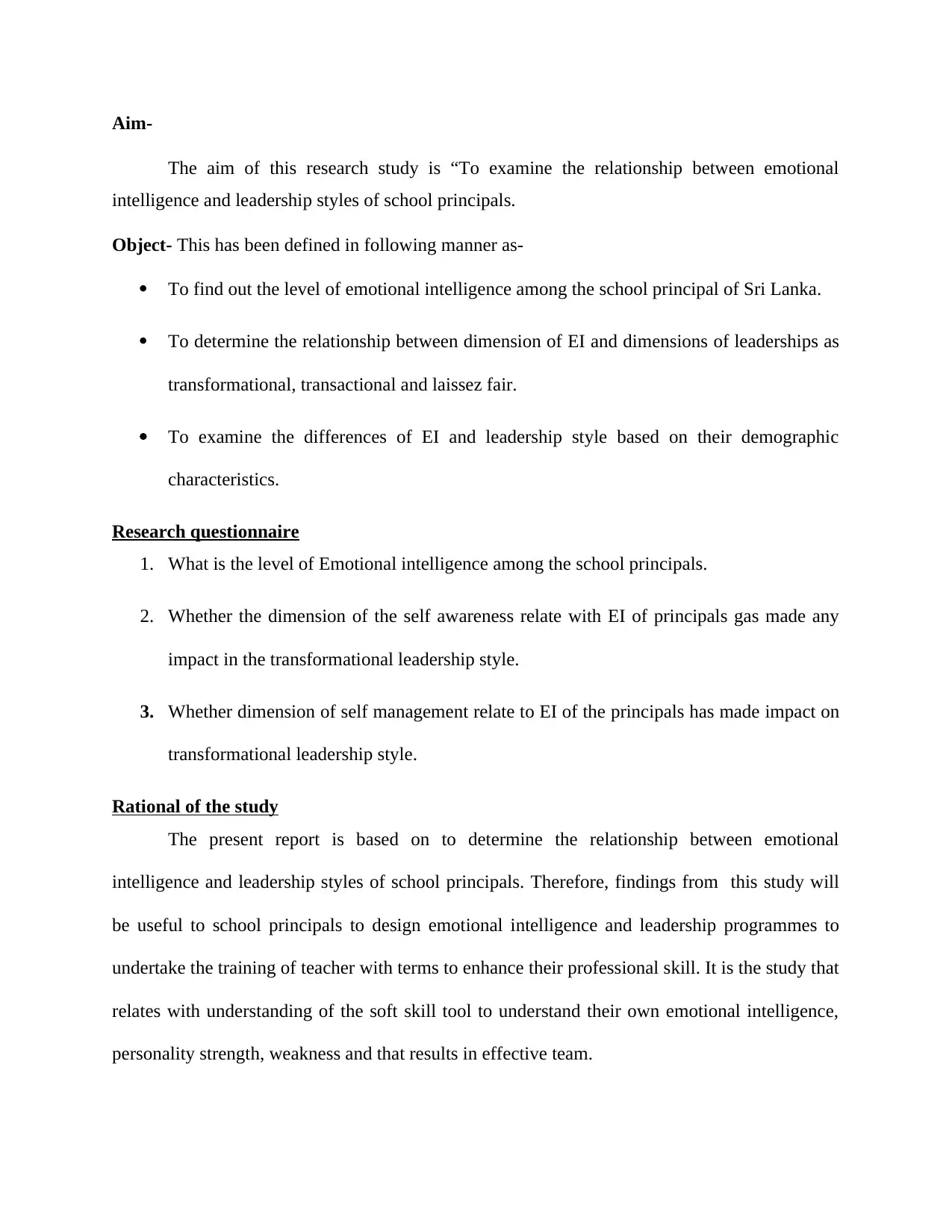
Aim-
The aim of this research study is “To examine the relationship between emotional
intelligence and leadership styles of school principals.
Object- This has been defined in following manner as-
To find out the level of emotional intelligence among the school principal of Sri Lanka.
To determine the relationship between dimension of EI and dimensions of leaderships as
transformational, transactional and laissez fair.
To examine the differences of EI and leadership style based on their demographic
characteristics.
Research questionnaire
1. What is the level of Emotional intelligence among the school principals.
2. Whether the dimension of the self awareness relate with EI of principals gas made any
impact in the transformational leadership style.
3. Whether dimension of self management relate to EI of the principals has made impact on
transformational leadership style.
Rational of the study
The present report is based on to determine the relationship between emotional
intelligence and leadership styles of school principals. Therefore, findings from this study will
be useful to school principals to design emotional intelligence and leadership programmes to
undertake the training of teacher with terms to enhance their professional skill. It is the study that
relates with understanding of the soft skill tool to understand their own emotional intelligence,
personality strength, weakness and that results in effective team.
The aim of this research study is “To examine the relationship between emotional
intelligence and leadership styles of school principals.
Object- This has been defined in following manner as-
To find out the level of emotional intelligence among the school principal of Sri Lanka.
To determine the relationship between dimension of EI and dimensions of leaderships as
transformational, transactional and laissez fair.
To examine the differences of EI and leadership style based on their demographic
characteristics.
Research questionnaire
1. What is the level of Emotional intelligence among the school principals.
2. Whether the dimension of the self awareness relate with EI of principals gas made any
impact in the transformational leadership style.
3. Whether dimension of self management relate to EI of the principals has made impact on
transformational leadership style.
Rational of the study
The present report is based on to determine the relationship between emotional
intelligence and leadership styles of school principals. Therefore, findings from this study will
be useful to school principals to design emotional intelligence and leadership programmes to
undertake the training of teacher with terms to enhance their professional skill. It is the study that
relates with understanding of the soft skill tool to understand their own emotional intelligence,
personality strength, weakness and that results in effective team.
Paraphrase This Document
Need a fresh take? Get an instant paraphrase of this document with our AI Paraphraser
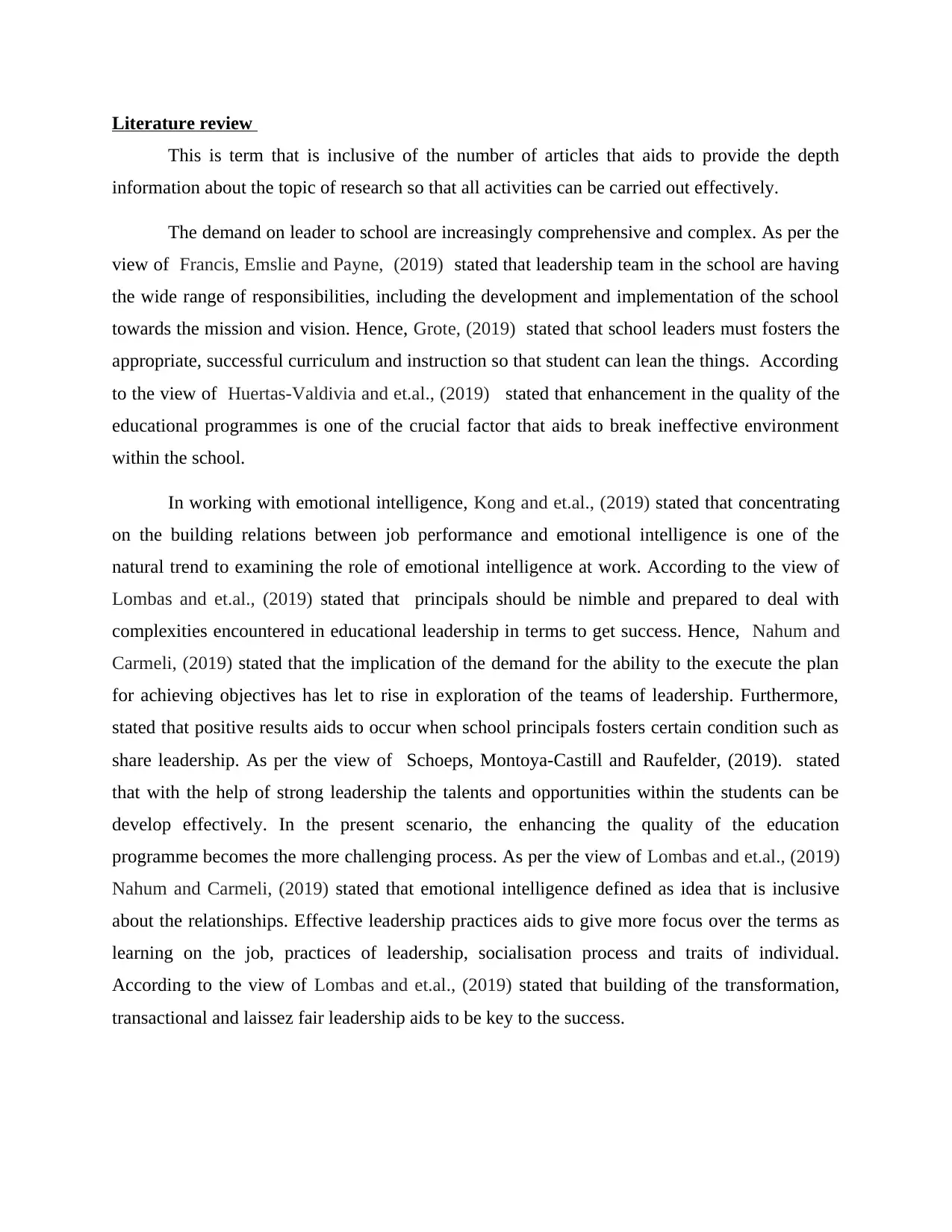
Literature review
This is term that is inclusive of the number of articles that aids to provide the depth
information about the topic of research so that all activities can be carried out effectively.
The demand on leader to school are increasingly comprehensive and complex. As per the
view of Francis, Emslie and Payne, (2019) stated that leadership team in the school are having
the wide range of responsibilities, including the development and implementation of the school
towards the mission and vision. Hence, Grote, (2019) stated that school leaders must fosters the
appropriate, successful curriculum and instruction so that student can lean the things. According
to the view of Huertas-Valdivia and et.al., (2019) stated that enhancement in the quality of the
educational programmes is one of the crucial factor that aids to break ineffective environment
within the school.
In working with emotional intelligence, Kong and et.al., (2019) stated that concentrating
on the building relations between job performance and emotional intelligence is one of the
natural trend to examining the role of emotional intelligence at work. According to the view of
Lombas and et.al., (2019) stated that principals should be nimble and prepared to deal with
complexities encountered in educational leadership in terms to get success. Hence, Nahum and
Carmeli, (2019) stated that the implication of the demand for the ability to the execute the plan
for achieving objectives has let to rise in exploration of the teams of leadership. Furthermore,
stated that positive results aids to occur when school principals fosters certain condition such as
share leadership. As per the view of Schoeps, Montoya‐Castill and Raufelder, (2019). stated
that with the help of strong leadership the talents and opportunities within the students can be
develop effectively. In the present scenario, the enhancing the quality of the education
programme becomes the more challenging process. As per the view of Lombas and et.al., (2019)
Nahum and Carmeli, (2019) stated that emotional intelligence defined as idea that is inclusive
about the relationships. Effective leadership practices aids to give more focus over the terms as
learning on the job, practices of leadership, socialisation process and traits of individual.
According to the view of Lombas and et.al., (2019) stated that building of the transformation,
transactional and laissez fair leadership aids to be key to the success.
This is term that is inclusive of the number of articles that aids to provide the depth
information about the topic of research so that all activities can be carried out effectively.
The demand on leader to school are increasingly comprehensive and complex. As per the
view of Francis, Emslie and Payne, (2019) stated that leadership team in the school are having
the wide range of responsibilities, including the development and implementation of the school
towards the mission and vision. Hence, Grote, (2019) stated that school leaders must fosters the
appropriate, successful curriculum and instruction so that student can lean the things. According
to the view of Huertas-Valdivia and et.al., (2019) stated that enhancement in the quality of the
educational programmes is one of the crucial factor that aids to break ineffective environment
within the school.
In working with emotional intelligence, Kong and et.al., (2019) stated that concentrating
on the building relations between job performance and emotional intelligence is one of the
natural trend to examining the role of emotional intelligence at work. According to the view of
Lombas and et.al., (2019) stated that principals should be nimble and prepared to deal with
complexities encountered in educational leadership in terms to get success. Hence, Nahum and
Carmeli, (2019) stated that the implication of the demand for the ability to the execute the plan
for achieving objectives has let to rise in exploration of the teams of leadership. Furthermore,
stated that positive results aids to occur when school principals fosters certain condition such as
share leadership. As per the view of Schoeps, Montoya‐Castill and Raufelder, (2019). stated
that with the help of strong leadership the talents and opportunities within the students can be
develop effectively. In the present scenario, the enhancing the quality of the education
programme becomes the more challenging process. As per the view of Lombas and et.al., (2019)
Nahum and Carmeli, (2019) stated that emotional intelligence defined as idea that is inclusive
about the relationships. Effective leadership practices aids to give more focus over the terms as
learning on the job, practices of leadership, socialisation process and traits of individual.
According to the view of Lombas and et.al., (2019) stated that building of the transformation,
transactional and laissez fair leadership aids to be key to the success.
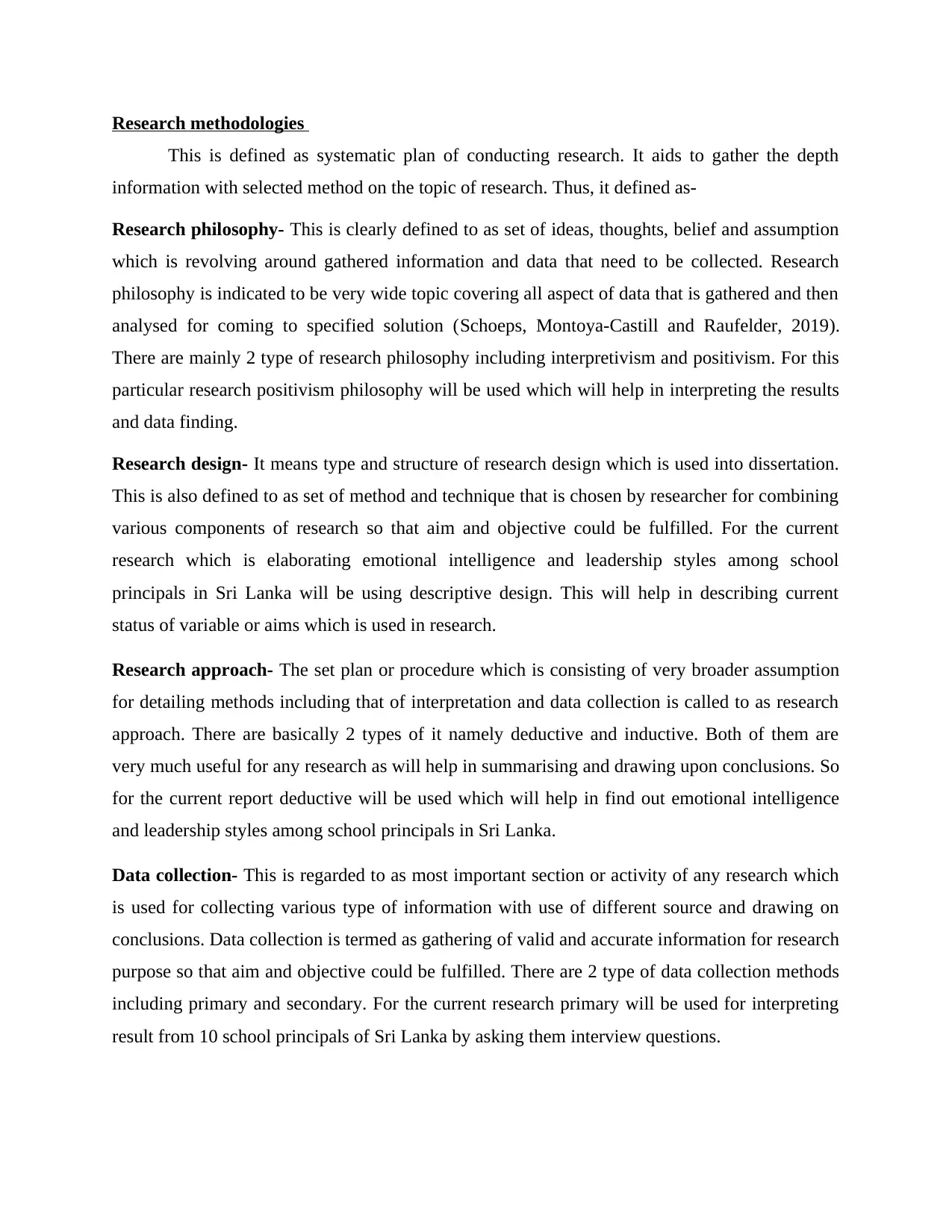
Research methodologies
This is defined as systematic plan of conducting research. It aids to gather the depth
information with selected method on the topic of research. Thus, it defined as-
Research philosophy- This is clearly defined to as set of ideas, thoughts, belief and assumption
which is revolving around gathered information and data that need to be collected. Research
philosophy is indicated to be very wide topic covering all aspect of data that is gathered and then
analysed for coming to specified solution (Schoeps, Montoya‐Castill and Raufelder, 2019).
There are mainly 2 type of research philosophy including interpretivism and positivism. For this
particular research positivism philosophy will be used which will help in interpreting the results
and data finding.
Research design- It means type and structure of research design which is used into dissertation.
This is also defined to as set of method and technique that is chosen by researcher for combining
various components of research so that aim and objective could be fulfilled. For the current
research which is elaborating emotional intelligence and leadership styles among school
principals in Sri Lanka will be using descriptive design. This will help in describing current
status of variable or aims which is used in research.
Research approach- The set plan or procedure which is consisting of very broader assumption
for detailing methods including that of interpretation and data collection is called to as research
approach. There are basically 2 types of it namely deductive and inductive. Both of them are
very much useful for any research as will help in summarising and drawing upon conclusions. So
for the current report deductive will be used which will help in find out emotional intelligence
and leadership styles among school principals in Sri Lanka.
Data collection- This is regarded to as most important section or activity of any research which
is used for collecting various type of information with use of different source and drawing on
conclusions. Data collection is termed as gathering of valid and accurate information for research
purpose so that aim and objective could be fulfilled. There are 2 type of data collection methods
including primary and secondary. For the current research primary will be used for interpreting
result from 10 school principals of Sri Lanka by asking them interview questions.
This is defined as systematic plan of conducting research. It aids to gather the depth
information with selected method on the topic of research. Thus, it defined as-
Research philosophy- This is clearly defined to as set of ideas, thoughts, belief and assumption
which is revolving around gathered information and data that need to be collected. Research
philosophy is indicated to be very wide topic covering all aspect of data that is gathered and then
analysed for coming to specified solution (Schoeps, Montoya‐Castill and Raufelder, 2019).
There are mainly 2 type of research philosophy including interpretivism and positivism. For this
particular research positivism philosophy will be used which will help in interpreting the results
and data finding.
Research design- It means type and structure of research design which is used into dissertation.
This is also defined to as set of method and technique that is chosen by researcher for combining
various components of research so that aim and objective could be fulfilled. For the current
research which is elaborating emotional intelligence and leadership styles among school
principals in Sri Lanka will be using descriptive design. This will help in describing current
status of variable or aims which is used in research.
Research approach- The set plan or procedure which is consisting of very broader assumption
for detailing methods including that of interpretation and data collection is called to as research
approach. There are basically 2 types of it namely deductive and inductive. Both of them are
very much useful for any research as will help in summarising and drawing upon conclusions. So
for the current report deductive will be used which will help in find out emotional intelligence
and leadership styles among school principals in Sri Lanka.
Data collection- This is regarded to as most important section or activity of any research which
is used for collecting various type of information with use of different source and drawing on
conclusions. Data collection is termed as gathering of valid and accurate information for research
purpose so that aim and objective could be fulfilled. There are 2 type of data collection methods
including primary and secondary. For the current research primary will be used for interpreting
result from 10 school principals of Sri Lanka by asking them interview questions.
⊘ This is a preview!⊘
Do you want full access?
Subscribe today to unlock all pages.

Trusted by 1+ million students worldwide
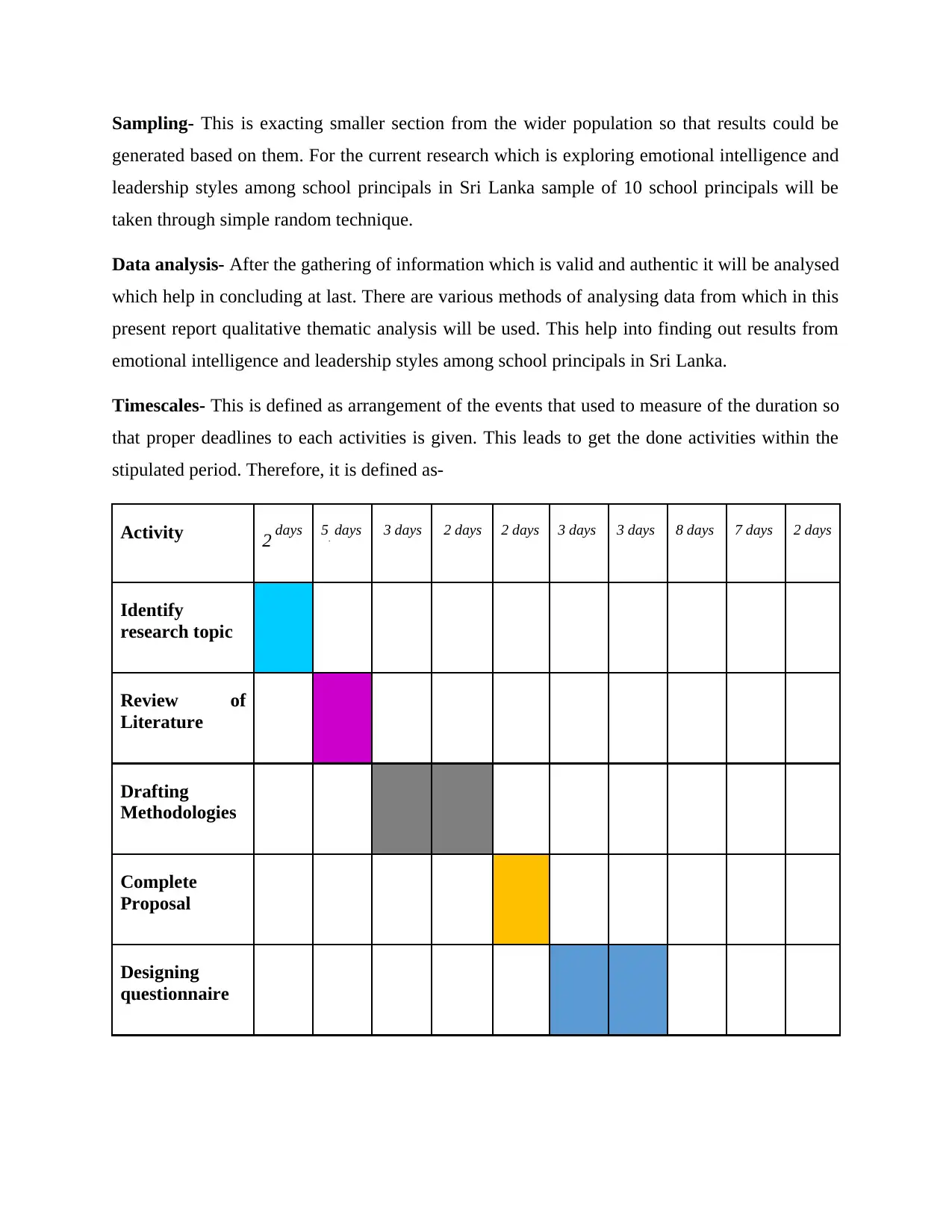
Sampling- This is exacting smaller section from the wider population so that results could be
generated based on them. For the current research which is exploring emotional intelligence and
leadership styles among school principals in Sri Lanka sample of 10 school principals will be
taken through simple random technique.
Data analysis- After the gathering of information which is valid and authentic it will be analysed
which help in concluding at last. There are various methods of analysing data from which in this
present report qualitative thematic analysis will be used. This help into finding out results from
emotional intelligence and leadership styles among school principals in Sri Lanka.
Timescales- This is defined as arrangement of the events that used to measure of the duration so
that proper deadlines to each activities is given. This leads to get the done activities within the
stipulated period. Therefore, it is defined as-
Activity 2 days 5. days 3 days 2 days 2 days 3 days 3 days 8 days 7 days 2 days
Identify
research topic
Review of
Literature
Drafting
Methodologies
Complete
Proposal
Designing
questionnaire
generated based on them. For the current research which is exploring emotional intelligence and
leadership styles among school principals in Sri Lanka sample of 10 school principals will be
taken through simple random technique.
Data analysis- After the gathering of information which is valid and authentic it will be analysed
which help in concluding at last. There are various methods of analysing data from which in this
present report qualitative thematic analysis will be used. This help into finding out results from
emotional intelligence and leadership styles among school principals in Sri Lanka.
Timescales- This is defined as arrangement of the events that used to measure of the duration so
that proper deadlines to each activities is given. This leads to get the done activities within the
stipulated period. Therefore, it is defined as-
Activity 2 days 5. days 3 days 2 days 2 days 3 days 3 days 8 days 7 days 2 days
Identify
research topic
Review of
Literature
Drafting
Methodologies
Complete
Proposal
Designing
questionnaire
Paraphrase This Document
Need a fresh take? Get an instant paraphrase of this document with our AI Paraphraser
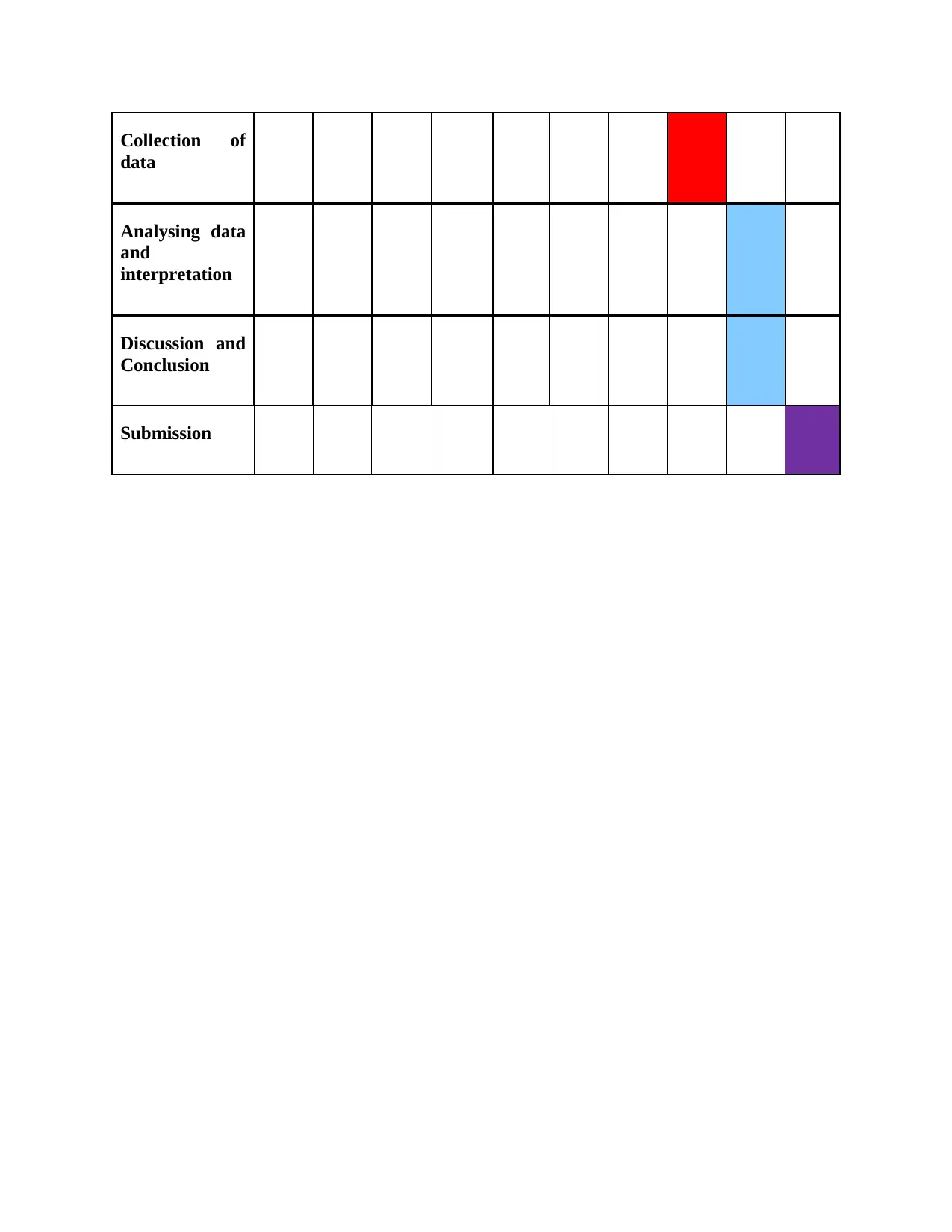
Collection of
data
Analysing data
and
interpretation
Discussion and
Conclusion
Submission
data
Analysing data
and
interpretation
Discussion and
Conclusion
Submission
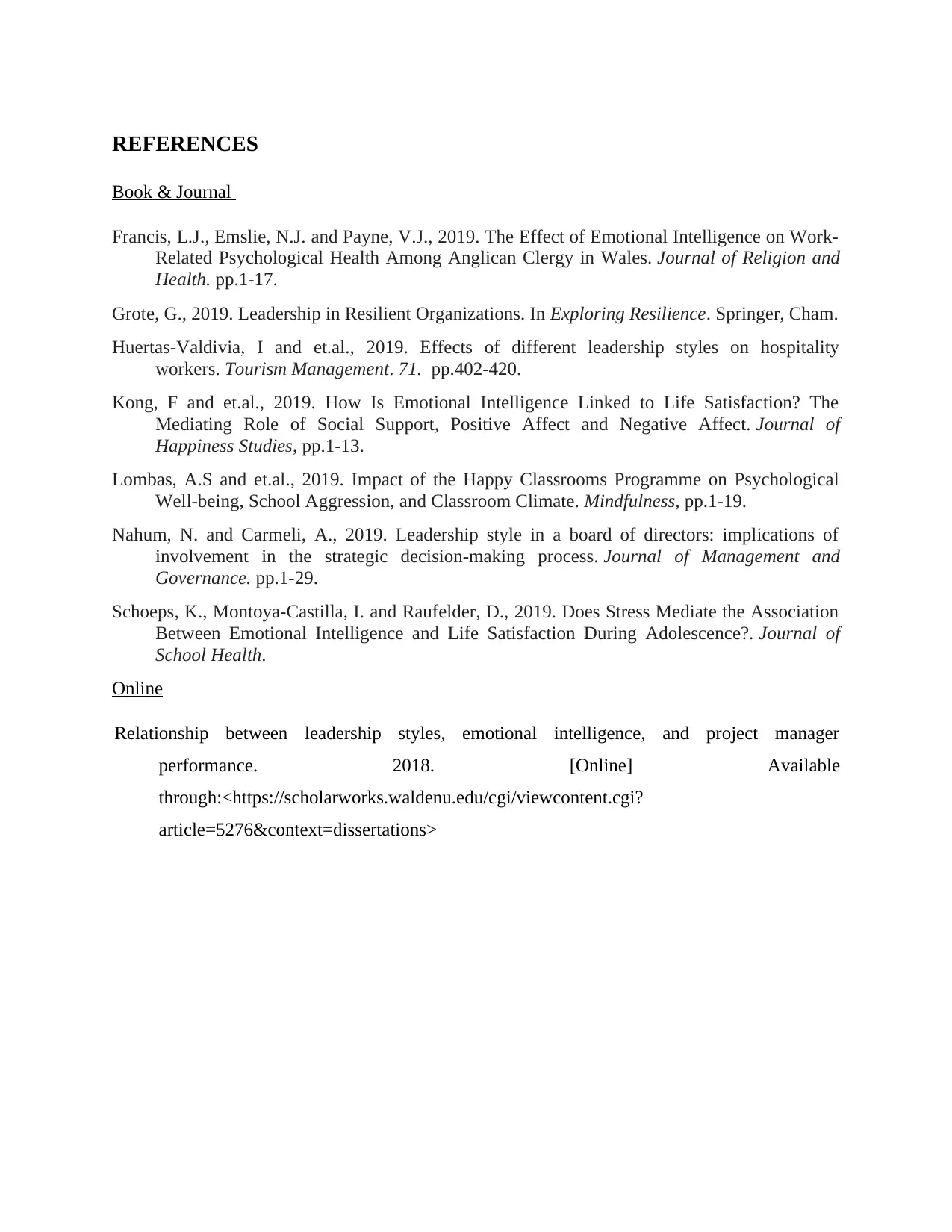
REFERENCES
Book & Journal
Francis, L.J., Emslie, N.J. and Payne, V.J., 2019. The Effect of Emotional Intelligence on Work-
Related Psychological Health Among Anglican Clergy in Wales. Journal of Religion and
Health. pp.1-17.
Grote, G., 2019. Leadership in Resilient Organizations. In Exploring Resilience. Springer, Cham.
Huertas-Valdivia, I and et.al., 2019. Effects of different leadership styles on hospitality
workers. Tourism Management. 71. pp.402-420.
Kong, F and et.al., 2019. How Is Emotional Intelligence Linked to Life Satisfaction? The
Mediating Role of Social Support, Positive Affect and Negative Affect. Journal of
Happiness Studies, pp.1-13.
Lombas, A.S and et.al., 2019. Impact of the Happy Classrooms Programme on Psychological
Well-being, School Aggression, and Classroom Climate. Mindfulness, pp.1-19.
Nahum, N. and Carmeli, A., 2019. Leadership style in a board of directors: implications of
involvement in the strategic decision-making process. Journal of Management and
Governance. pp.1-29.
Schoeps, K., Montoya‐Castilla, I. and Raufelder, D., 2019. Does Stress Mediate the Association
Between Emotional Intelligence and Life Satisfaction During Adolescence?. Journal of
School Health.
Online
Relationship between leadership styles, emotional intelligence, and project manager
performance. 2018. [Online] Available
through:<https://scholarworks.waldenu.edu/cgi/viewcontent.cgi?
article=5276&context=dissertations>
Book & Journal
Francis, L.J., Emslie, N.J. and Payne, V.J., 2019. The Effect of Emotional Intelligence on Work-
Related Psychological Health Among Anglican Clergy in Wales. Journal of Religion and
Health. pp.1-17.
Grote, G., 2019. Leadership in Resilient Organizations. In Exploring Resilience. Springer, Cham.
Huertas-Valdivia, I and et.al., 2019. Effects of different leadership styles on hospitality
workers. Tourism Management. 71. pp.402-420.
Kong, F and et.al., 2019. How Is Emotional Intelligence Linked to Life Satisfaction? The
Mediating Role of Social Support, Positive Affect and Negative Affect. Journal of
Happiness Studies, pp.1-13.
Lombas, A.S and et.al., 2019. Impact of the Happy Classrooms Programme on Psychological
Well-being, School Aggression, and Classroom Climate. Mindfulness, pp.1-19.
Nahum, N. and Carmeli, A., 2019. Leadership style in a board of directors: implications of
involvement in the strategic decision-making process. Journal of Management and
Governance. pp.1-29.
Schoeps, K., Montoya‐Castilla, I. and Raufelder, D., 2019. Does Stress Mediate the Association
Between Emotional Intelligence and Life Satisfaction During Adolescence?. Journal of
School Health.
Online
Relationship between leadership styles, emotional intelligence, and project manager
performance. 2018. [Online] Available
through:<https://scholarworks.waldenu.edu/cgi/viewcontent.cgi?
article=5276&context=dissertations>
⊘ This is a preview!⊘
Do you want full access?
Subscribe today to unlock all pages.

Trusted by 1+ million students worldwide
1 out of 9
Related Documents
Your All-in-One AI-Powered Toolkit for Academic Success.
+13062052269
info@desklib.com
Available 24*7 on WhatsApp / Email
![[object Object]](/_next/static/media/star-bottom.7253800d.svg)
Unlock your academic potential
Copyright © 2020–2026 A2Z Services. All Rights Reserved. Developed and managed by ZUCOL.





